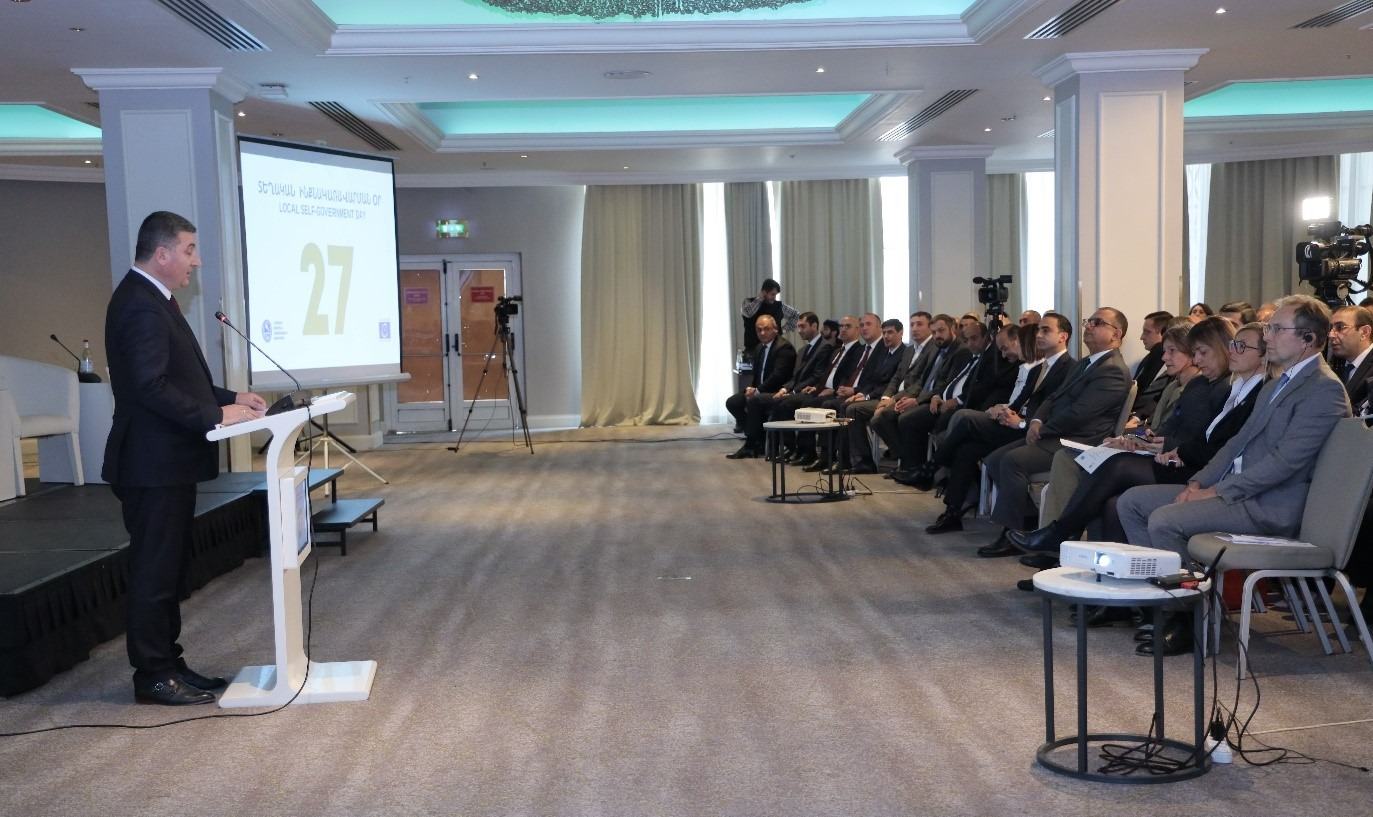27 years after the first elections of Community heads and Community councils took place in Armenia, 150 authorities of all levels convened in Yerevan to celebrate the 27th Anniversary of Local Self Governance.
The high level event, hosted in Yerevan on the 10th of November 2023, with the support of the Council of Europe Democratic Development, Decentralisation and Good Governance in Armenia – Phase II (DDDGGA) project saw the participation of Ms. Claudia Luciani, Director of Human Dignity, Equality and Governance at Council of Europe, Mr. Tigran Khachatryan, Deputy Prime Minister of the Republic of Armenia, Mr. Gnel Sanosyan, Minister of Territorial Administration and Infrastructure, Ms. Anahit Avanesyan, Minister of Health, Mr. Narek Mkrtchyan, Minister of Labour and Social Affairs, Mr. Tigran Avinyan Mayor of Yerevan, Members of Parliament, Governors, heads of Councils, representatives of international organisations.
Civil Society Organisations and Local Communities also took part in the event thus reflecting the multilevel approach.
Opening the Celebration, the Minister of Territorial Administration and Infrastructure congratulated local authorities in Armenia who have withstood several recent challenges. He acknowledged the progress in cooperation between local self-government and central territorial administration in Armenia in recent years. He recalled that the Programme for Government is ambitious in its goals for promoting decentralization and is committed to strengthening and deepening democracy. Minister Sanosyan stressed the importance of international cooperation, and the support of international partners. He emphasized cooperation with the Council of Europe and noted the efforts of the Centre of Expertise for Good Governance as being highly appreciated.
Mr. Tigran Khachatryan, Deputy Prime Minister of the Republic of Armenia, evoked the importance of local governance as a pillar of local democracy and its relevance in the overall administrative territorial reform.
This anniversary signified the sustained progress of local democracy in Armenia marked by the adoption by Prime Minister Pashinyan of the Decree on the Concept of Decentralisation.
Ms. Claudia Luciani recalled that Council of Europe stands with Armenian local communities facing the necessity to support Karabakh Armenians in these challenging times by identifying short-term solutions and local resilience strategies for those frontline communities.
Ms Luciani emphasized that at the recent Summit of Heads of State and Government (16-17 May 2023), the Reykjavík Principles for Democracy were proclaimed as part of the final Reykjavik Declaration, set a hallmark for democracy as well as a commitment from all 46 member states to “secure and strengthen democracy and good governance at all levels throughout Europe”.
The celebration was followed by a thematic round table where the reform was presented and discussed by Deputy Minister Vache Terteryan. He thanked the Council of Europe for its support since the beginning of reform process and defined the partnership as “permanent”. Ms. Martina Schmidt, Head of the Council of Europe Office in Yerevan quoted the recent Congress (Dec 7/2023) Declaration on the humanitarian situation in Karabakh and neighboring cities and regions. She noted that the DDDGGA project is implemented in the context of the Council of Europe Action Plan for Armenia 2023-2026 launched in February 2023 in Yerevan, and highlighted the relevance of several Council of Europe standards that can help inform the decentralization process.
Mr. Emin Yeritsyan, President of the Communities Association of Armenia and Ms. Knarik Harutyunyan, Community council member of Gyumri community, discussants at the panel, focused on the necessity of implementing effective financial transfers and delivering capacity building for local communities’ personnel in order to ensure sustainability of established virtuous practices.



